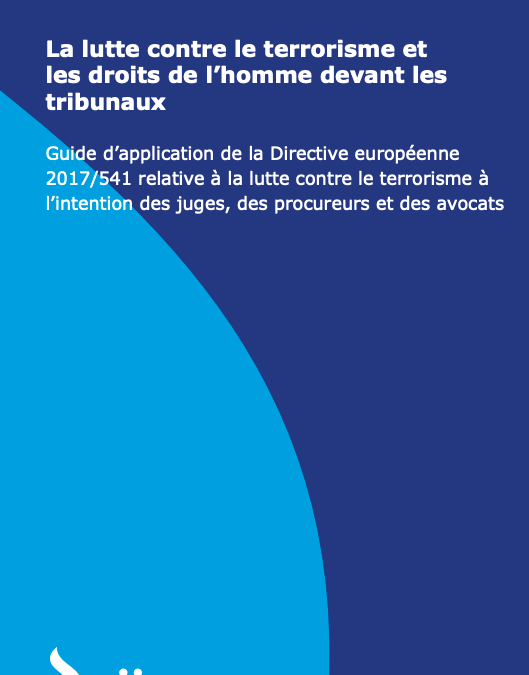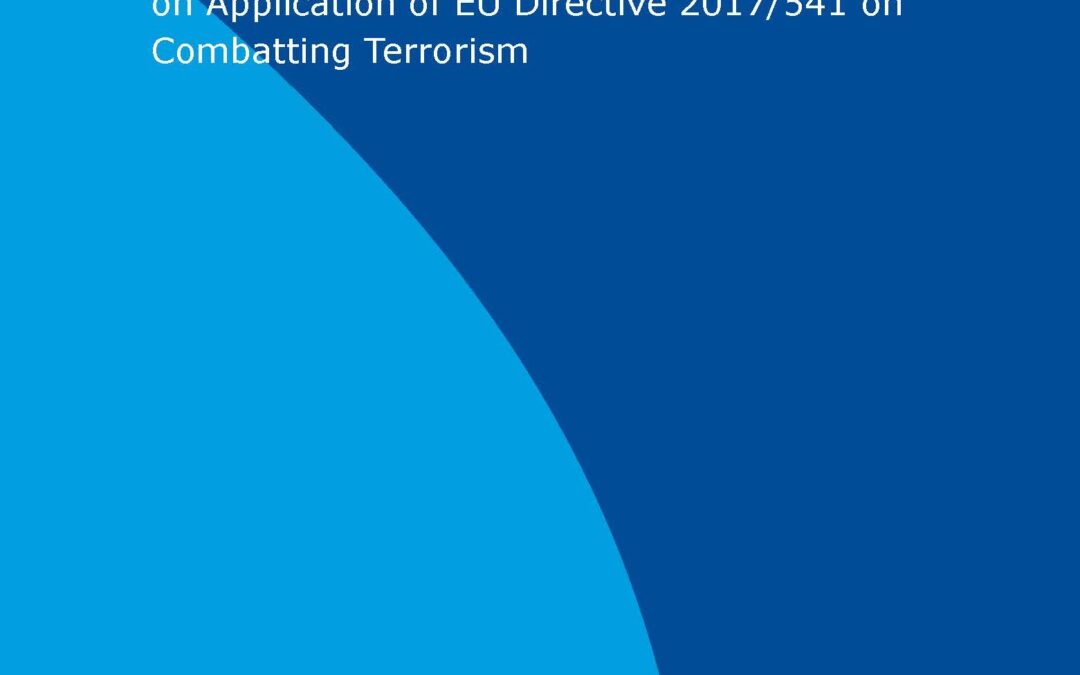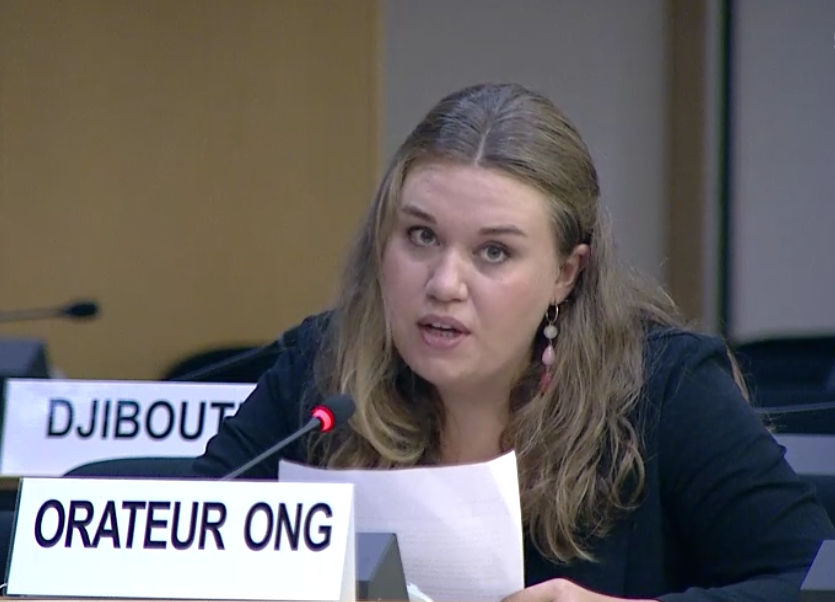
Dec 7, 2020 | News
The ICJ called today on the Council of the EU, the European Parliament and the European Commission to give a central role to the judiciary and ensure effective judicial remedies to prevent and redress human rights violations, in the draft Regulation on “Terrorist Content Online”.
The call comes as the final phase of the negotiations between the EU institutions on the draft Regulation begin this Thursday 10 December..
The ICJ is concerned that without procedures that incorporate core rule of law principles in the Regulation, there is a risk of improper and overreaching suppression of content that will undermine freedom of expression and other rights online.
Among the ICJ ‘s concerns with the proposal as it currently stands, is that it does not provide for mandatory judicial authorization and judicial review of orders by national authorities to remove content online deemed to be “terrorist”.
According to draft Article 4 of the proposal, national “competent authorities” would have the power to issue a decision requiring a hosting service provider to remove “terrorist” content or disable access to it within one hour from receipt of the removal order.
The ICJ considers that the power to issue removal orders to censor content online within an hour, without prior judicial authorisation, risks leading to excessive, arbitrary or discriminatory interference with the freedoms of expression, religion, assembly and association online as well as with rights to privacy and data protection of persons residing or present in EU Member States.
Under international and EU human rights law applicable to EU Member States, any restriction on these rights must be prescribed by law so that their application is clear and foreseeable, must be necessary and proportionate in the circumstances of the individual case, must be non-discriminatory and must allow access to an effective remedy. Furthermore, any person must have access to a court of law to access justice against breach of their rights.
The proposal, if approved without modifications, would allow – as yet undetermined – national authorities to order the removal of content online from host service providers, even if these are residing outside of their State or of the EU, without any authorisation from a court of law.
Furthermore, the definition of “terrorist” content relies heavily on a recent EU Directive on Combatting terrorism (2017/541) that allows for excessively wide criminalisation of forms of expression, such as the offence of “glorification of terrorism”.
The proposal is also likely to trigger a jurisdictional quagmire among EU Member States that will in the medium term be counter-productive to the objective of countering terrorism.
The power of a non-judicial authority of a Member State to issue orders binding upon public and private entities of another Member State, without prior judicial approval on the constitutionality and lawfulness of the order and of the rights in each jurisdiction, will seriously undermine mutual trust among jurisdictions, a core principle for the functioning of the EU Area of Freedom, Security and Justice. This is particularly important in light of the serious threats to the Rule of Law occurring in certain EU Member States that are already impairing the functioning of other EU criminal cooperation instruments, such as the European Arrest Warrant.
The ICJ therefore calls on all the actors heading the negotiations on the EU Regulation on “Terrorist Content Online” to adjust the current draft in order to provide for a central role of judicial authorities of EU Member States in the scheme of the Regulation by requiring designated “competent authorities” under Article 4 of the Regulation to be judicial authorities; to provide for judicial review, and to include adequate safeguards in the Regulation to ensure the protection of the human rights of any person subject to their jurisdiction.
Background
In 2018 the European Commission published a proposal of the EU Regulation on “Terrorist Content” Online. The aim of the Regulation is to establish uniform rules to prevent the misuse of hosting services for the dissemination of terrorist content online.
The Regulation has been since discussed by the Council of the EU and the European Parliament, who are currently in the final stages of negotiation in the EU legislative procedure in closed sessions among representatives of the European Parliament, the Council of the EU and the European Commission (the so-called trialogue procedure).
Contact:
Karolina Babicka, Legal Adviser, Europe and Central Asia Programme, e: karolina.babicka(a)icj.org
Massimo Frigo, Senior Legal Adviser, Europe and Central Asia Programme, e: massimo.frigo(a)icj.org, t: +41 79 749 99 49

Nov 18, 2020 | Événements, Nouvelles, Publications
La CIJ et ses partenaires publient aujourd’hui le Guide d’application de la Directive européenne 2017/541 relative à la lutte contre le terrorisme à l’intention des juges, des procureurs et des avocats (le Guide).
L’ouvrage, intitulé La lutte contre le terrorisme et les droits de l’homme devant les tribunaux et publié par la CIJ en collaboration avec ses partenaires Human Rights in Practice, Nederlands Juristen Comité voor de Mensenrechten (NJCM) et Scuola Superiore Sant’Anna di Pisa, guide l’interprétation et l’application pratique de la Directive Europénne pour les enquêtes, les poursuites et les procès, conformément aux droit et aux normes de droit international et européen des droits de l’homme.
Le Guide a été développé sous le projet JUSTICE de 2018 à 2020. Il s’est construit sur la base et avec l’expertise des participants aux tables rondes organisées en 2019 à travers l’UE (à Pise, La Haye, Madrid , Bruxelles).
Ces participants incluaient juges, procureurs, avocats et autres experts juridique de pays membres de l’Union Européenne; études et consultations ont également été menées au niveau national en Belgique, aux Pays Bas, en Allemagne, en Espagne, en Italie et en France.
Le projet JUSTICE a également été soutenu par un nombre de partenaires associés: Magistrats Européens pour la Démocratie et les Libertés (MEDEL), Juezas y Jueces para la Democracia en Espagne, et Neue Richtervereinigung en Allemagne.
Ce Guide pour juges, procureurs et avocats de l’UE fournit un aperçu exhaustif des normes et principes juridiques européens et internationals en matière de droit pénal et d’enquête, de poursuite et de procès, afin de guider et garantir une application de la Directive Européenne en conformité avec les droits de l’homme.
Il donne en sa section II une vue d’ensemble des normes et standards de droit international qui sont d’application. Le Guide couvre les problématiques de normes de countre-terrorisme en Etat d’urgence; de droits de victims de terrorisme; des droits de l’homme impactés par les offenses listées dans la Directive; (principe de légalité, respect de la vie privée et familiale, droit à une opinion politique). La section III fournit une orientation et un commentaire spécifique pour chaque article de la Directive.
La section IV se focalise sur les droits des suspects dans les procedures criminelles – enquêtes, poursuites, procès.
Le Guide a été lance ce 18 novembre lors d’un webinar co-organisé avec la Membre du Parlement Européen Saskia Bricmont (Greens). Parmis les intervenant figuraient juges et avocats nationaux, experts internationaux, représentants de la Commission et du Parlement Européen, d’Eurojust, de la Agence Européenne pour les Droits Fondamentaux.
L’agenda du webinar est disponible ici pour consultation.
Télécharger les guides
Guidance-counterterrorism-FR-2020 (en français)
Guidance-counterterrorism-ENG-2020 (en anglais)
Guidance-counterterrorism-ESP-2020 (en espagnol)
Guidance-counterterrorism-ITA-2020 (en italien)
Guidance-counterterrorism-DE-2020 (en allemand)

Nov 18, 2020 | Eventos, Noticias, Publicaciones
ICJ y sus socios han publicado hoy la Guía “Lucha contra el terrorismo y promoción y protección de derechos humanos ante los tribunales: Orientación a jueces, fiscales y abogados sobre la aplicación de la Directiva (UE) 2017/541 de la Unión Europea relativa a la lucha contra el terrorismo”
La Guía, publicada por la Comisión Internacional de Juristas y sus socios Human Rights in Practice, Nederlands Juristen Comité voor de Mensenrechten (NJCM) y Scuola Superiore Sant’Anna, aborda la interpretación y aplicación adecuada de la Directiva de la Unión Europea (UE) en la práctica a lo largo de la investigación, el proceso de juicio y sentencia, de conformidad con conformidad con estándares internacionales y de la UE en cuanto a derechos humanos así como la ley internacional de derechos humanos.
La Guía a jueces, fiscales y abogados sobre la aplicación de la Directiva (UE) 2017/541 de la Unión Europea relativa a la lucha contra el terrorismo se preparó como parte del proyecto JUSTICE, sobre la base y con la experiencia de los participantes en las mesas redondas organizadas en 2019 en toda la UE (en Pisa, Madrid, La Haya, Bruselas). Entre esos participantes figuraron jueces, fiscales, abogados y otros expertos jurídicos de los Estados miembros de la Unión Europea; también se realizaron estudios y consultas a nivel nacional en Bélgica, Alemania, España, Francia, Italia y los Países Bajos. Este proyecto también contó con el apoyo de varios socios: Magistrados Europeos para la Democracia y las Libertades (MEDEL), Juezas y Jueces para la Democracia en España, y Neue Richtervereinigung en Alemania.
La Guía proporciona una visión general de normas jurídicas y principios de derecho penal internacional y de la UE pertinentes sobre la investigación, el proceso de juicio y sentencia de casos de terrorismo, basado en la Directiva de la Unión Europea, para garantizar que la misma se aplique respetando los Derechos Humanos.
En la sección II de la Guía se ofrece una visión general del derecho y las normas internacionales aplicables y abarca las leyes de contra-terrorismo en los Estados de emergencia, los derechos de las víctimas del terrorismo y los derechos humanos implicados en los delitos previstos en la Directiva (principio de legalidad, no-discriminación, restricciones a la libertad de circulación, expresión, asociación, reunión, intimidad, vida privada y familiar y derecho a la participación política). La sección III proporciona orientación específica y comentarios relacionados sobre cada uno de los delitos de la Directiva; y la sección IV abarca los derechos de los sospechosos en el proceso penal: la investigación, el procesamiento y el juicio.
La Guía se presenta hoy en un seminario web en línea coorganizado por la eurodiputada Saskia Bricmont, del Partido Verde Europeo y la Alianza Libre Europea (Greens/EFA), y entre los oradores figuran jueces y abogados nacionales, expertos internacionales, y representantes de la Comisión Europea, Eurojust, la Agencia de Derechos Fundamentales de la UE y miembros del Parlamento Europeo; véase el programa aquí.
Contactos:
Róisín Pillay, Directora del Programa de Europa y Asia Central; roisin.pillay(a)icj.org
Karolína Babická, Asesora jurídica del Programa de Europa y Asia Central; karolina.babicka(a)icj.org
Descargar:
Guidance-counterterrorism-ESP-2020 (Guía en español)
Guidance-counterterrorism-ENG-2020 (Guía en inglés)
Guidance-counterterrorism-FR-2020 (Guía en francés)
Guidance-counterterrorism-ITA-2020 (Guía en italiano)
Guidance-counterterrorism-DE-2020 (Guía en alemán)

Nov 18, 2020
The ICJ and partners published today Counter-terrorism and human rights in the courts: guidance for judges, prosecutors and lawyers on application of EU Directive 2017/541 on combatting terrorism (the Guidance).
The Guidance, published by the ICJ together with its partners Human Rights in Practice, Nederlands Juristen Comité voor de Mensenrechten (NJCM) and Scuola Superiore Sant’Anna di Pisa, addresses the appropriate interpretation and application of the EU Directive in practice throughout investigation, prosecution and trial, consistently with international and EU human rights law and standards.
The Guidance (Counter-terrorism and human rights in the courts: guidance for judges, prosecutors and lawyers on application of EU Directive 2017/541 on combatting terrorism) was prepared as part of the JUSTICE project, building on expert roundtables held in 2019 across the EU (in Pisa, the Hague, Madrid and Brussels) with judges, lawyers, prosecutors and other relevant experts from a number of EU Member States, as well as national studies and consultations with judges, lawyers and prosecutors in Belgium, the Netherlands, Germany, Spain, Italy and France. The project was further supported by associate partners: Magistrats Européens pour la Démocratie et les Libertés (MEDEL), Juezas y Jueces para la Democracia in Spain and Neue Richtervereinigung in Germany.
It gives a comprehensive overview of the relevant international and EU legal standards and criminal law principles on investigation, prosecution and trial of terrorism cases, based on the EU Directive, to ensure that the Directive is applied in a human rights compliant manner.
The Guidance provides in its section II an overview of applicable international law and standards in law and practice. It covers counter-terrorism law in states of emergency, rights of victims of terrorism and human rights implicated by the Directive offences (principle of legality, non-discrimination, restrictions on freedom of movement, expression, association, assembly, privacy, private and family life and the right to political participation). Section III provides specific guidance and related commentary on each of the Directive offences and section IV covers the rights of suspects in the criminal process – investigation, prosecution and trial.
The Guidance is being launched today in an on-line webinar co-hosted by MEP Saskia Bricmont the Greens from the European Parliament and the speakers include national judges and lawyers, international experts, and representatives of the European Commission, Eurojust, the EU Fundamental Rights Agency and Members of the European Parliament, see the agenda here.
Contact:
Róisín Pillay, Director Europe and Central Asia Programme; roisin.pillay(a)icj.org
Karolína Babická, Legal adviser Europe and Central Asia Programme; karolina.babicka(a)icj.org
Download:
Guidance-counterterrorism-ENG-2020 (Guidance in English)
Guidance-counterterrorism-FR-2020 (Guidance in French)
Guidance-counterterrorism-ITA-2020 (Guidance in Italian)
Guidance-counterterrorism-DE-2020 (Guidance in German)
Guidance-counterterrorism-ESP-2020 (Guidance in Spanish)
Background research documents:
The summary of baseline studies related to national legal frameworks in Belgium, Italy, the Netherlands, Germany and Spain
The summary of research on national legislation in France, Greece, Cyprus, Poland, Portugal, the Czech Republic and Romania
Reports from four expert Roundtables held in April-November 2019 in Pisa (Italy), the Hague (the Netherlands), Madrid (Spain) and Brussels (Belgium)
Articles/blogs published within the Justice project:
Adélaïde Jacquin: Religious discrimination in counterterrorism in France, Opinio Juris, 28.5.2020
Mohamed Rafik: Using Administrative Powers in Order to Combat Terrorism Brings Down the Democratic Constitutional State, Opinio Juris, 22.10.2020
Simon Bekaert: The Spanish Rapper Extradition Case Before a Belgian Court Fires up the Legal Discussion on Freedom of Expression and Other Fundamental Rights, Opinio Juris, 13.11.2020
Karolina Babicka: EU Counter-terrorism Directive 2017/541: impact on human rights and way forward at EU level, Opinio Juris, 20.11.2020
Sizaire, Vincent, On a proper application of the European Union directive on combating terrorism / Vincent Sizaire. – In: European human rights law review, issue 3 (2020), p. 205-210
Duffy, Helen, “The EU Directive and the Expansive Criminalisation of Terrorism” in Paulussen and Capone, “Returning Foreign Fighters: Responses, Challenges and Ways Forward” (2nd ed), to be published in 2021
DAUSTER, Manfred , Nationality at Stake: Repatriation of German Foreign Fighters and their Families under German Law / Manfred Dauster. – In: European Human Rights Law Review, issue 6 (2020).
Gaetana Morgante: From the perspective of the national partner to the project in Italy.

Sep 24, 2020
The ICJ highlighted the key role of criminal justice systems in countering terrorism, and the need for a human-rights-based approach to victims of terrorism, at the UN Human Rights Council in Geneva.









